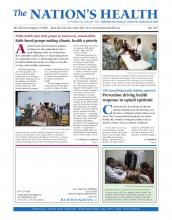Spanish-speaking parents seeking care for their children may encounter communication barriers with providers, according to a study published in the January-February issue of Academic Pediatrics.
Children often must depend on their parents or guardians to relay their health issues to providers, making communication between parents and providers all the more important.
“All too often I think we see parents who rely on their kids to be translators, and in a health care environment, that can be a very difficult thing to do,” study researcher Dylan Roby, PhD, MPhil, told The Nation’s Health.
Researchers analyzed data from the 2011 and 2012 California Health Interview Survey public use child files. The survey assessed children’s health and health care experiences through interviews with their parents. The study looked at experiences of Hispanic children in relation to their parents’ household language and citizenship status. While there were no significant differences in care in regard to parents’ language or citizenship, disparities in provider-patient communication were identified.
Parents who both only spoke Spanish and those who were both non-citizens were the least likely to report that their children’s providers gave them clear instructions, and were also the least likely to communicate with their children’s doctors via phone or email. Parents who were both non-citizens were also less likely to report that their children’s doctors listened carefully to them.
Even non-citizens are afforded relatively good access to care in California, with enrollment in the state-funded Medicaid program, according to Roby, director of graduate studies in the Department of Health Services Administration at the University of Maryland School of Public Health. However, the study indicated gaps in access among people who are not citizens and do not speak English fluently persist.
While people who do not speak English have the right to a health care interpreter, people may be unaware that the option is available to them, Roby said. In addition, he noted, some health care systems rely on LanguageLine Solutions for interpretation services, but the system may complicate communication when passing a phone back and forth between a health care provider and parent.
Such communication obstacles point to the “need to pursue patient-centered approaches” that take people’s language and culture into account, Roby said, including “empowering parents to understand how health care should work in terms of having access to an interpreter (and) making sure they’re aware of their rights to an interpreter.”
“These findings suggest that although many pediatric health systems in California have made great strides in improving access to and quality of care for Latino children, there is more work to do to ensure that the most vulnerable of Latino children and families do not experience communication barriers,” the study stated.
For more information, visit www.academicpedsjnl.net/article/S1876-2859(16)30560-5/fulltext.
- Copyright The Nation’s Health, American Public Health Association









